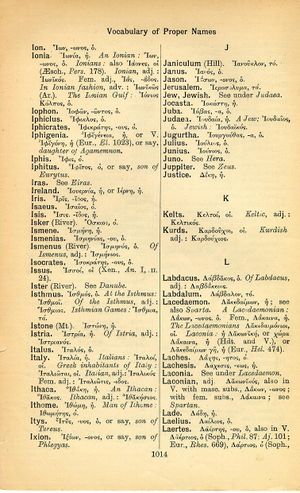Iphiclus: Difference between revisions
From LSJ
ἐὰν ἐκπέσῃ τὸ σιδήριον καὶ αὐτὸς πρόσωπον ἐτάραξεν καὶ δυνάμεις δυναμώσει καὶ περισσεία τοῦ ἀνδρείου σοφία (Ecclesiastes 10:10, LXX version) → If the iron axe fails, and the man has furrowed his brow, he will gather his strength, and the redoubling of his manly vigor will be the wise thing.
(Gf-D_5) |
m (Text replacement - "}}]]" to "}}]]") |
||
| Line 1: | Line 1: | ||
{{WoodhouseENELnames | {{WoodhouseENELnames | ||
|Text=[[File:woodhouse_1014.jpg|thumb | |Text=[[File:woodhouse_1014.jpg|thumb | ||
|link={{filepath:woodhouse_1014.jpg | |link={{filepath:woodhouse_1014.jpg}}]]Ἴφικλος, ὁ. | ||
}} | }} | ||
{{Lewis | {{Lewis | ||
Revision as of 10:09, 15 August 2017
English > Greek (Woodhouse)
Ἴφικλος, ὁ.
Latin > English (Lewis & Short)
Īphī̆clus: i, m., = Ἴφικλος,>
I one of the Argonauts, a swift runner, Ov. H. 13, 25; cf. also Hyg. Fab. 14; 103; Val. Fl. 1, 370.
Latin > French (Gaffiot 2016)
Īphiclus,¹⁵ ī, m. (Ἴφικλος), fils d’Amphitryon et d’Alcmène : Ov. H. 13, 25.

